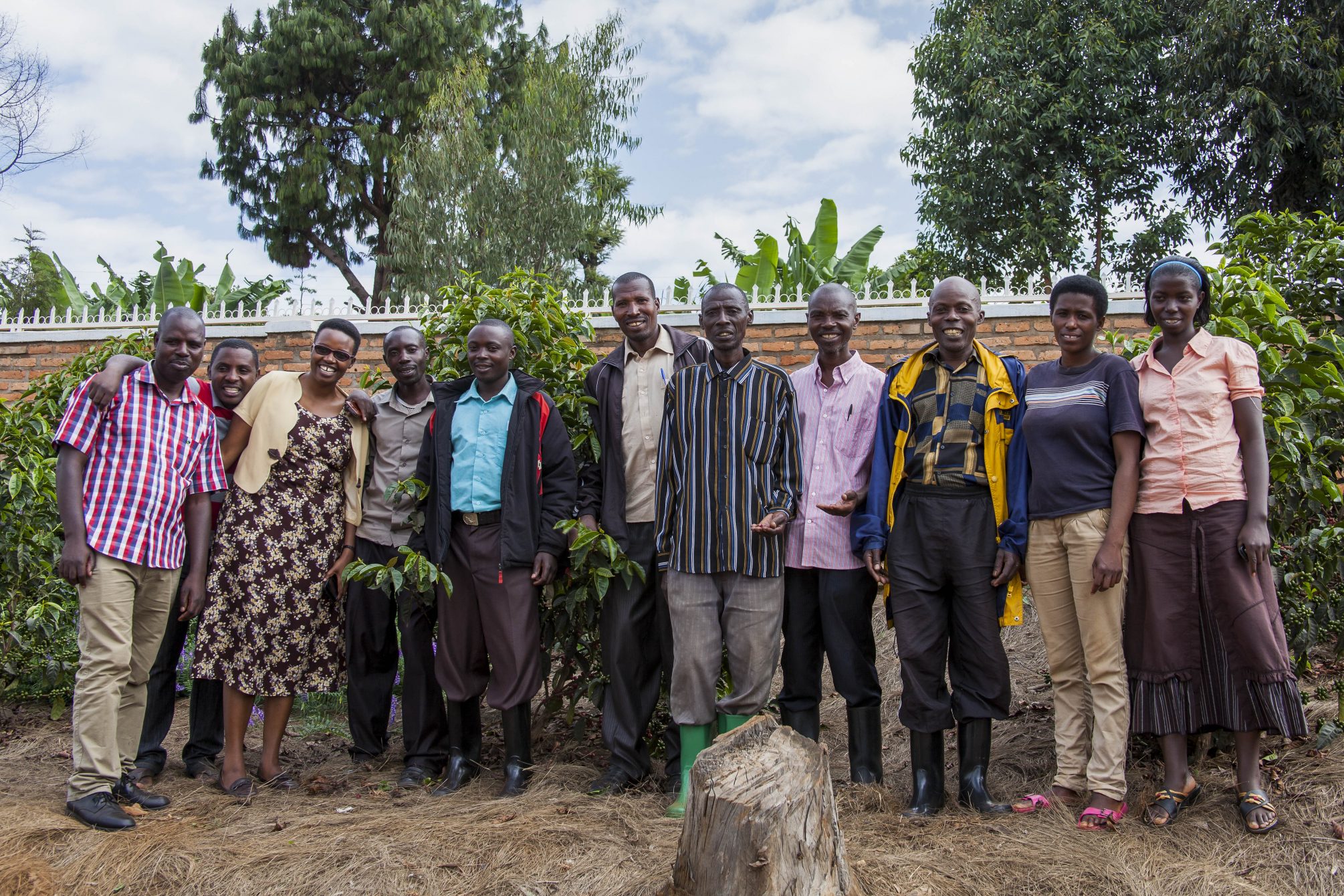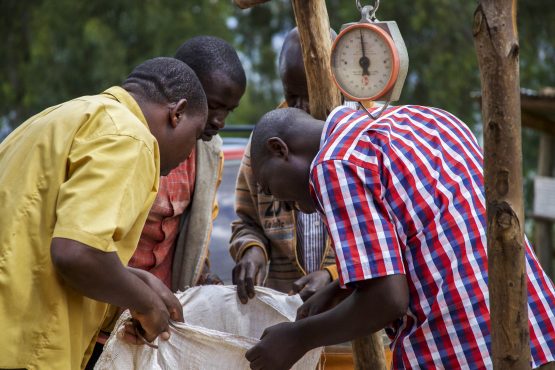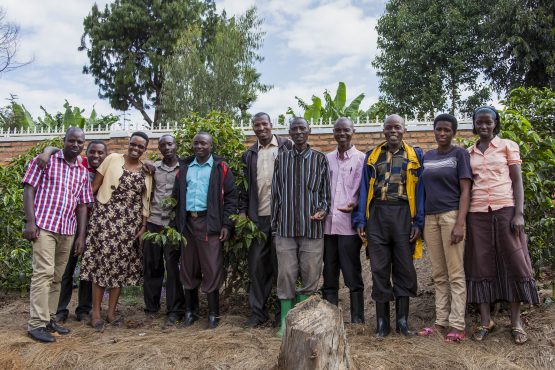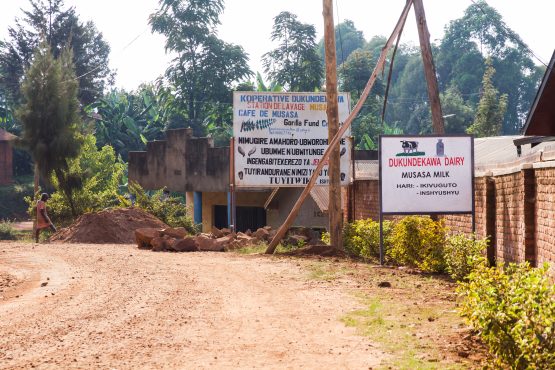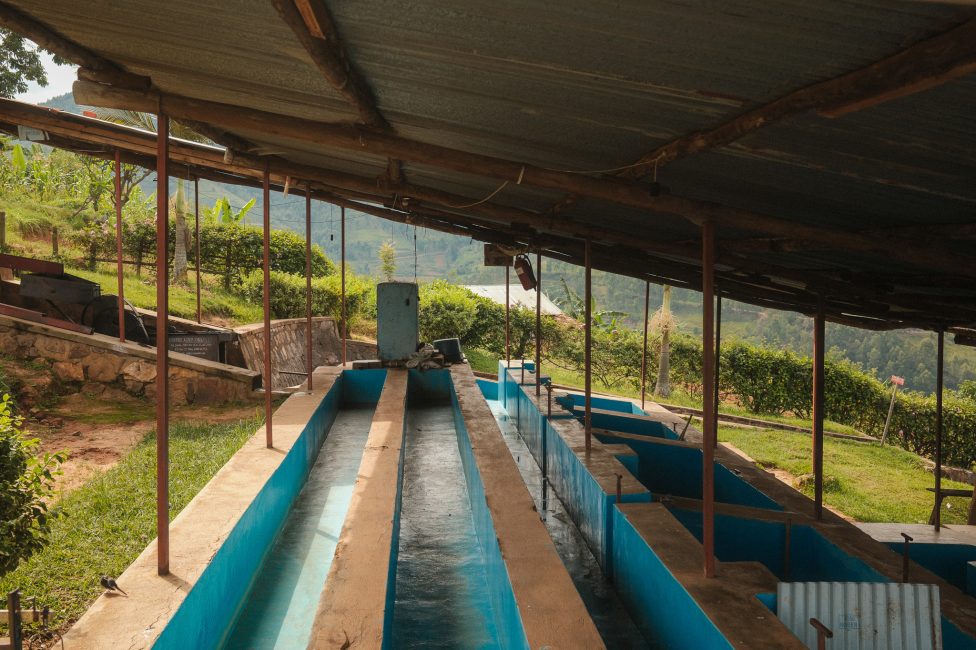Dukunde Kawa
Honey sweetness, creamy mouthfeel, and heavy body with notes of red apple, orange, roasted hazelnuts and juicy orange.
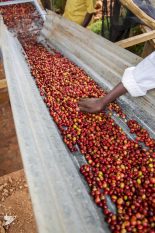 This beautiful coffee is a fantastic representation of the meticulous and dedicated hard work that our partners at Dukunde Kawa Cooperative conduct year in, year out.
This beautiful coffee is a fantastic representation of the meticulous and dedicated hard work that our partners at Dukunde Kawa Cooperative conduct year in, year out.
It comes from the Ruli washing station which is owned by the Dukunde Kawa Cooperative. The washing station is located in the rugged Northwest in the town of Musasa, at around 1,960 metres above sea level. Close to the famous Virunga (Volcanoes) National Park, this part of the world has the mineral-rich soil and lush environment that are well-suited to specialty coffee.
Ruli is Dukunde Kawa’s first and biggest washing station. Approximately 814 cooperative members deliver coffee cherries to this washing station, which employs 155 people during the harvest from the surrounding villages.
Dukunde Kawa now owns three washing stations. In addition to Ruli, they own two smaller washing stations called Nkara and Mbilima. The cooperative has nearly 1,100 contributing members, of whom 20% are female farmers.
ABOUT THE DUKUNDE KAWA COOPERATIVE
The Dukunde Kawa Cooperative was established in 2000. Three years later, it built its first washing station, Ruli, with the help of a development loan from the Rwandan government and the support of the USAID-funded Partnership for Enhancing Agriculture in Rwanda through Linkages (PEARL) program. This transformational program was aimed at switching the focus of the Rwandan coffee sector from an historic emphasis on quantity to one of quality—and, in doing so, opened Rwanda up to the far higher-earning specialty coffee market. The program and its successor, Sustaining Partnerships to enhance Rural Enterprise and Agribusiness Development (SPREAD), have been invaluable in helping Rwanda’s small-scale coffee farmers rebuild their production in the wake of the devastating 1994 genocide and the 1990s world coffee crash.
All of Dukunde Kawa’s members are small-scale producers who typically own less than a quarter of a hectare of land each. They use this land to cultivate an average of 250–300 coffee trees, along with other subsistence food crops such as maize and beans. By selling their coffee to Dukunde Kawa, these farmers are able to process their cherries centrally and combine their harvests into quantities large enough for export. Dukunde Kawa provides its members with agronomy training, access to fertilisers and organic pesticides, and a host of other resources to support farms and families.
In order to become a member of Dukunde Kawa, a coffee farmer first submits a letter of interest, which is presented at the cooperative’s general assembly. The cooperative’s agronomist then visits the applicant’s farm, and the local cooperative members vote on the new membership. Once approved, the applicant pays a joining fee that, in turn, goes back into the cooperative.
Before the proliferation of cooperatives and washing stations in Rwanda, small farmers sold semi-processed cherries on to a middleman, and the market was dominated by a single exporter. This commodity-focused system—coupled with declining world prices in the 1990s—brought severe hardship to farmers, some of whom abandoned coffee entirely.
Today, it’s a different picture. Farmers who work with Dukunde Kawa have seen their income at least double, and the co-op produces outstanding lots of coffee for us year after year.
Dukunde Kawa has been recognised in the Rwandan Cup of Excellence competition in years 2010, 2011, 2012, 2013, 2014, and most recently in the 2015 competition, winning 21st place.
Dukunde Kawa has a very transparent relationship with its members. They pay a fixed rate at the start of the harvest for coffee delivered to the station, and then reward all farmers with a second payment later in the season, based on any additional profits they have been able to secure from lots that have sold for higher than expected prices.
In an effort to continuously help their members improve the quality of coffee produced, the cooperative have built classrooms at Ruli washing station, along with a model farm that is used to demonstrate best practices in coffee farming.
In addition to the great work that the cooperative does with quality improvement and assurance, it also operates various social programs that greatly contribute to the livelihoods of their members. Assistance with school fees and medical insurance are provided along with training in quality and productivity in cultivation of coffee. In addition they have set up a “Farmers Savings Account” which provides a line of credit for farmers needing access to funds (for things like health care, problems at home, farming materials etc). The farmers are divided into 31 groups, and each month the groups get together to approve credit to farmers who apply.
IMPROVEMENTS AT DUKUNDE KAWA
Dukunde Kawa is a highly creative and dynamic cooperative. We have been working with this cooperative since 2008, and every time we visit, we’re impressed by the new investments and improvements implemented by the cooperative.
Recently, for example, the cooperative has invested in three new mechanical cherry sorters (which divide the ripe from underripe cherries prior to pulping the coffee)—one for each of its washing stations. These machines are expensive and difficult to get to the rural washing station so it’s a significant and commendable investment made by the cooperative. This kind of decision is a great example of how the Dukunde Kawa cooperative thinks about and appreciates the kind of long-term investment that is essential to produce high quality coffee.
In addition, at the Ruli washing station, the cooperative has also built a milk-refrigeration facility to help generate off-season income for farmers and their families. Farmers are able to supplement their income through the sales of milk, and the community benefits as it is able to access fresh milk and cheese which helps improve their diets. In addition, their cows produce very useful fertiliser for the coffee! The cooperative is now also raising funds for a pasteurisation machine, which will enable farmers to sell their milk in Kigali for higher prices.
Dukunde Kawa has also completed construction on its very own dry mill and warehouse, which is very rare for rural Rwanda—this sort of infrastructure is usually found only in the urban centre of Kigali. This (excitingly) gives them more control over the processing, and means even more micro-lot separation will be possible as well as more experimental lots in coming years. They are also in the process of constructing a cupping room where farmers will be trained to taste and critically evaluate their coffees.
‘Dukunde Kawa’ means ‘love coffee’ in Kinyarwanda (Rwanda’s official language), in reference to the power of coffee to improve the lives of those in rural communities.
The cooperative works extremely hard to improve the lives of its members and their families, and to produce the best quality coffee possible. According to the co-op’s president, Anastase Minani, Dukunde Kawa’s goal is to be the very best cooperative in Rwanda. We think they’re well on their way to achieving this goal!
HOW COFFEE AT DUKUNDE KAWA IS PROCESSED
The team at Dukunde Kawa takes a huge amount of care in processing its coffee. All members of the Dukunde Kawa Cooperative are trained to only select the very ripest coffee cherries from their trees.
- During the harvest, cherries are delivered daily to the washing station via foot, bicycle or driven by truck from a local pick-up point. On delivery the cherries are inspected and sorted to ensure only the very ripest cherries are processed. They are then sorted by weight (and any floaters removed) and pulped on the same day— almost always in the evening—using a mechanical pulper that divides the beans into three grades by weight (the heaviest—or A1—usually being the best).
- After pulping, the coffee is fermented overnight for around 12–18 hours and then graded again using floatation channels that sort the coffee by weight. The beans are then soaked for a further 24 hours, before being moved to raised screens for ‘wet-sorting’ by hand.
- As with most washing stations in Rwanda, women do the majority of hand-sorting. This takes place in two stages—on the covered pre-drying tables and on the drying tables. Washed beans are moved from the wet fermentation tanks onto the pre-drying tables, where they are intensively sorted under shade for around six hours. The idea is that greens (unripes) are still visible when the beans are damp, while the roofs over the tables protect the beans from the direct sunlight.
- Next, the beans are moved onto the washing station’s extensive raised drying tables (‘African Beds’) for around two weeks, where they are sorted again for defects, turned regularly and protected from rain and the midday sun by covers, ensuring both even drying and the removal of any damaged or defective beans. During this period the coffee is also turned several times a day by hand to ensure the coffee dries evenly and consistently.
- After reaching 11% humidity, the coffee is then stored in parchment in Ruli’s purpose-built warehouse prior to final dry-milling and hand sorting at the Cooperative’s brand new dry mill at the Ruli washing station.
